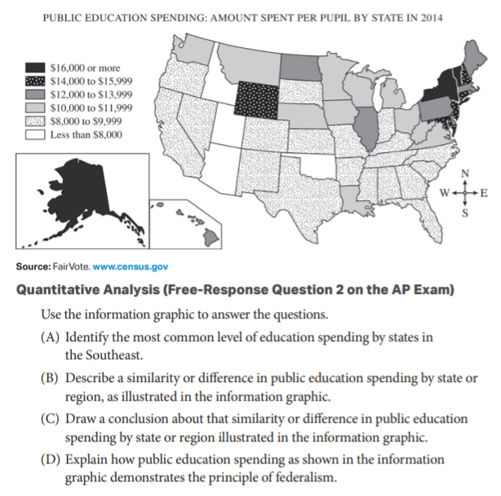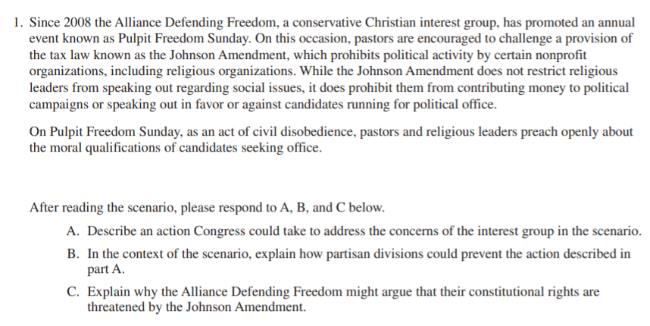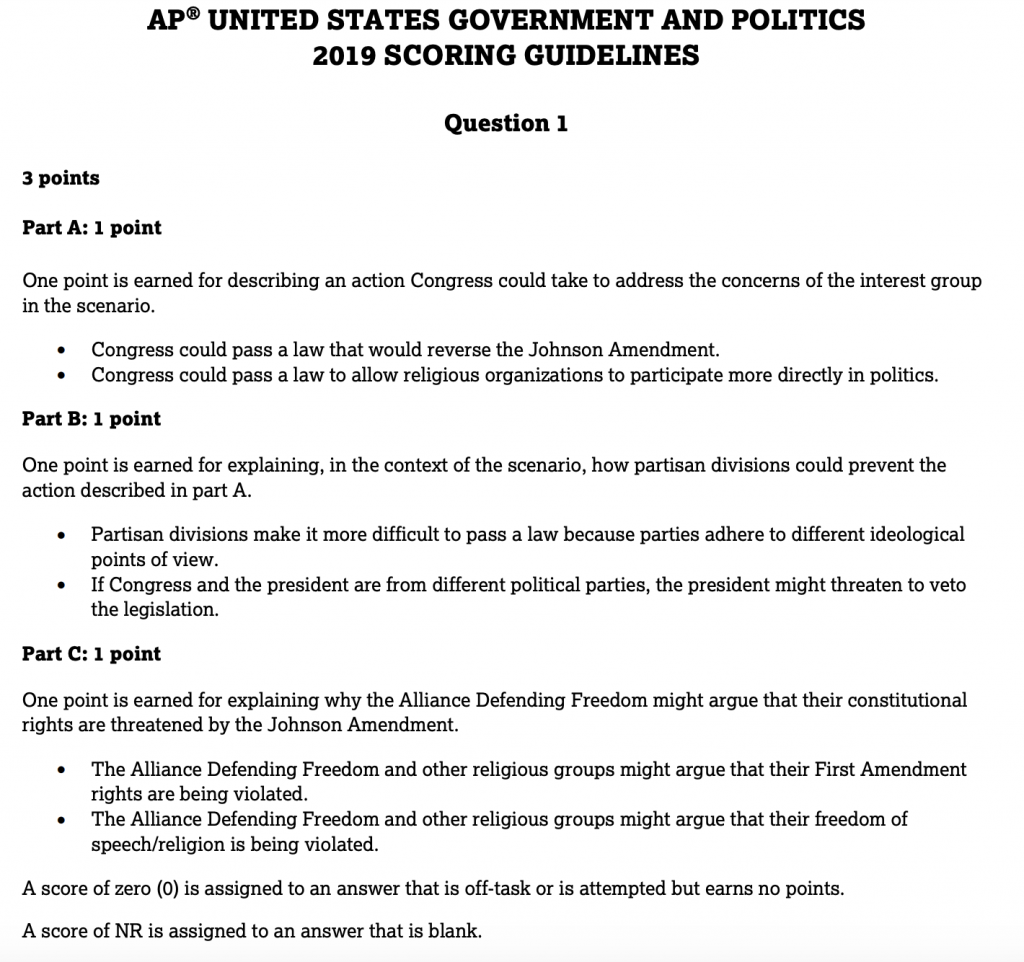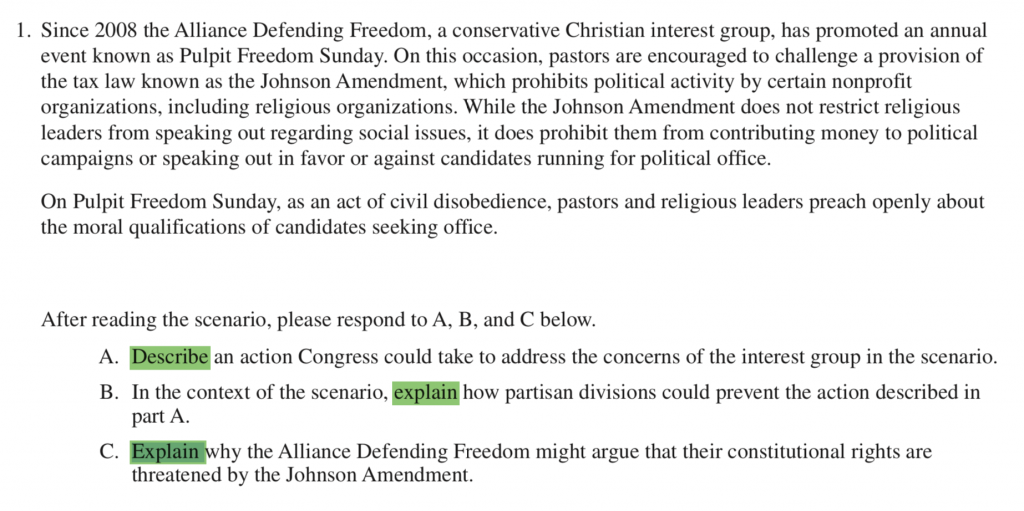Find what you need to study

AP US Gov FRQ: Argument Essay Review (2020)
6 min read • june 11, 2020
Fatima Raja
So, you’re reading this article and wondering how to approach the APGOPO and CompGov Argument Essay. First of all, no, this is not like a dinner table argument over politics that happens in every movie at Thanksgiving. Unlike one of those discussions, you have to actually use facts to get your point across (😂), and the reader is more concerned about your line of reasoning than about their own political opinions 👀.
Let’s break down exactly what you should expect, so you can craft a solid argument:
In total, you have an hour and 40 minutes to finish the entire Free-Response Question section if you're in APGOPO. If you're in APCompGov, you have an hour and 30 minutes It’s important to use your time effectively because the FRQ section is worth half of your score.
Because of that, you should spend around 25 minutes, give or take a few, on the Argument Free-Response Question. (NOTE: FOR THE 2019-2020 TEST, YOU WILL HAVE 25 MINUTES TO WRITE AND 5 MINUTES TO UPLOAD YOUR RESPONSE.)

This is the nightmare you’re not gonna have before this AP exam.
Image courtesy of Freepik.
Obviously, you want to be able to conserve time and learn how to do these FRQs as effectively and quickly as possible. Here’s the secret to doing that: practice! You have to apply the concepts you’re learning to actual questions, so you understand how to break them down when you’re under pressure.
That way, you can get these skills down to muscle-memory and not be too stressed when you get to test day!
Structure (What does the FRQ look like?)
You’re gonna get a prompt that you have to write about (duh), but here’s the thing the point is not to explain or restate the prompt. The point is to develop an argument based on it .
Don’t just write about the situation that the prompt sets up. You need to explain why we should or should not do whatever the example is. This is an argument essay, so you need to argue a position. It doesn’t have to be the “right” position. It just needs to be logical and supported with evidence.
This is what you’ll be given to do just that:
A prompt. You have to explicitly agree or disagree with it when you state your thesis!
A few foundational documents. You’re required to use at least one example that is listed, so make sure you know them.
Note for CompGov: Sorry, you don’t get these. Just make sure you include a specific piece of evidence.
But, you also need a few other things to actually get all the points available:
An additional piece of evidence. This can be a different foundational document than the one you initially used or any specific concept from APGOPO or CompGov.
Analysis. You have to explain why your evidence justifies your line of reasoning (aka your thesis).
An alternate perspective. Not everyone will agree with the position you take. That’s the beauty of democracy. To show you understand that, you have to refute your point or provide some concession to another POV (NOTE: THIS IS NOT NEEDED FOR THE 2019-2020 TEST.)
Now that you know what to expect, let’s figure out how to tackle the Argument FRQ!
How to Tackle the Argument Essay
Here’s what you need to do to tackle this FRQ thoroughly:
Look at the prompt and start thinking of a thesis. You may have a personal opinion right after looking at the prompt, or you may not. Either way, as you start to look at the provided documents, start brainstorming how you want to write your essay. It’s okay if this changes when you see what evidence is provided or what evidence you come up with on your own. It’s just good to have a jumping board.
Analyze the documents! This means you need to look at each of the foundational documents (again, CompGov, you don’t get any) and figure out how they fit into the context of the prompt. Does the evidence in question agree or disagree with the situation the prompt presents? How can you use it to support or refute your argument?
Create an outline. This is a good way to figure out exactly what you’re going to say, and you know what evidence you’re using. This will help you have a clear, well-thought out essay. Your outline shouldn’t be incredibly detailed, though! You still have to transfer everything to your writing booklet before you run out of time.
State your thesis. This is critical to ensuring you get full points. If the prompt asks whether or not America should switch to being a direct democracy, don’t just give a wishy-washy list of pros and cons. Make your answer explicit : “Yes, America should transition to being a direct democracy because x and y.” or “No, America should not become a direct democracy because of p and q.” Don’t turn your essay into a treasure hunt for your argument, just state it plainly.

POV: you’re reading this article, taking notes, and getting ready to win this FRQ game.
Image courtesy of Pixabay
Provide justification! You already know that you need two pieces of evidence , but that’s not all. You can’t just say something like “The Articles of Confederation show that we should have a strong federal government.” It should be more like, “The problematic Articles of Confederation only further exemplify why we need to have a strong federal government, as expanded federal power is necessary to prevent the dissolution of the Union by dangerous uprisings, such as the Whiskey Rebellion.” You need to explain why each piece of evidence strengthens your argument. Don’t just toss in a vague reference and call it a day.
Consider an alternate perspective. This is critical to ensuring you get full points. Showing that you understand that your argument isn’t the only way to approach a situation shows you understand that every approach has its pros and cons. So, refute your argument or explain a situation in which it may not apply. Pro tip: showing why the example you used to weaken your argument is wrong only strengthens it! (NOTE: THIS IS NOT NEEDED FOR THE 2019-2020 TEST.)
Some Final Tips!
Practice! Practice! Oh, and did I say that you need to practice? Getting familiar with the structure and time constraints you’ll be under when writing the argument essay will allow you to actually get comfortable with it. You’ll understand how to apply the strategies I just talked about and discover some of your own!
Breathe! Don’t freak out. You may be feeling the pressure, but you’ve been prepping for this all year (or all semester). You put in the work, and you’ll be fine! Keeping a cool head will help you get the best score you can.

Practice Prompts!
Here are some prompts to get you started:
The right to free speech for all citizens is protected in America. Though the Supreme Court has limited journalistic expression in some cases and individual states have worked to restrict the right of citizens to assemble, free speech remains a defining pillar of American society.
Develop an argument about whether restrictions on free speech and assembly ultimately help or hinder democracy.
Use at least one piece of evidence from one of the following foundational documents:
Bill of Rights
Letter from Birmingham Jail
Federalist 10
Since 200, Russian President Vladimir Putin has ensured that he wins Russian presidential elections. The presidential elections are rigged for Putin to win and to demonstrate his hold on Russian society. Russian opposition parties have gained some ground in recent years, seemingly in spite of Kremlin interference.
Develop an argument about whether elections have strengthened or weakened democracy in Russia.
Watch: Argumentative Essay Writing Workshop

Stay Connected
© 2024 Fiveable Inc. All rights reserved.
AP® and SAT® are trademarks registered by the College Board, which is not affiliated with, and does not endorse this website.

- Teacher Opportunities
- AP U.S. Government Key Terms
- Bureaucracy & Regulation
- Campaigns & Elections
- Civil Rights & Civil Liberties
- Comparative Government
- Constitutional Foundation
- Criminal Law & Justice
- Economics & Financial Literacy
- English & Literature
- Environmental Policy & Land Use
- Executive Branch
- Federalism and State Issues
- Foreign Policy
- Gun Rights & Firearm Legislation
- Immigration
- Interest Groups & Lobbying
- Judicial Branch
- Legislative Branch
- Political Parties
- Science & Technology
- Social Services
- State History
- Supreme Court Cases
- U.S. History
- World History
Log-in to bookmark & organize content - it's free!
- Bell Ringers
- Lesson Plans
- Featured Resources

Lesson Plan: AP Government: Argumentative Essay Practice
The Federalist Papers
Boston College professor Mary Sarah Bilder gives a brief overview backgrounding the Federalist Papers
Description
This is intended as an end-of-course review activity for practice with the argumentative essay format included on the AP United States Government and Politics exam since the 2018 redesign. Eleven practice prompts are provided, reflecting content from Units 1-3.
ARGUMENTATIVE ESSAY PROMPT ANALYSIS
- Review the provided Argumentative Essay Prompts in either an individual or jigsaw format.
- Write a thesis statement for your selected prompt(s) and identify the selection you would make from the provided list and the second piece of evidence you would choose.
- If there are prompts for which you struggle to develop a thesis, or items on the bulleted lists with which you are not conversant, use the hyperlinked C-SPAN Classroom resources to extend your understanding of the required founding documents and SCOTUS cases that you found challenging.
ARGUMENTATIVE ESSAY
- Chose one or more of the provided Argumentative Essay Prompts , as assigned, and use the planning and exploration you did above to write a full essay in response to your designated prompt(s) in 25 or fewer minutes , since that's the time limit you'll face on the AP Exam!
- Exchange essays with a classmate and evaluate each others' work.
- 1st Amendment
- Branches Of Government
- Constitution
- House Of Representatives
- Separation Of Powers
- Supreme Court

Choose Your Test
Sat / act prep online guides and tips, the complete guide to ap us government frqs.
Advanced Placement (AP)

Free-response questions, or FRQs, on the AP US Government exam are more straightforward than those on some other AP tests, but they can still be tough if you're not ready for them. In this guide, we will lay out a simple step-by-step method for answering AP Government FRQs , go through a real example, and tell you where you can find additional practice resources.
AP Government Free-Response Section Format
The free-response section lasts one hour and 40 minutes and consists of four questions , each of which is worth 12.5% of your total score. So as a whole, the free-response section accounts for half your total AP Gov score (the other 50% comes from the multiple-choice section). Each FRQ is worth 3-6 raw points.
Here are the four types of FRQs you'll get on the AP Government exam:
- Concept Application (3 raw points)
- Quantitative Analysis (4 raw points)
- SCOTUS Comparison (4 raw points)
- Argument Essay (6 raw points)
The free-response questions will ask you to integrate your knowledge of the various content areas covered by the course. This includes analyzing political events in the US, discussing examples, and demonstrating your understanding of general principles of US government and politics. You'll also be asked to examine data from charts, define key terms, and explain the roles that different parts of our government play in the political system.
The following chart shows specifically what you must do for each FRQ on the AP Government test. All info below comes from the 2020 AP US Government and Politics Course and Exam Description .

AP Government FRQs: 5-Step Solution Process
This section provides a step-by-step process for answering any question on the AP US Government exam. Here's a sample question from the 2020 AP Gov Course and Exam Description that I'll reference throughout so you can see how these steps might work in practice:

Step 1: Read the Introductory and Concluding Sentences
Free-response questions #1 and #3 will include passages, while question #2 will have an image or a chart with data. Skim the first and final sentences of the passage (or title of the graphic for #2) before you get to the tasks (labeled A-C or A-D). This will help you get a rough sense of what to expect in the rest of the question.
It's a good idea to read the intros and conclusions to all the FRQs before choosing which one to begin with. Doing this might help build up your confidence and improve your efficiency to start with a question that's easier for you.
In the sample question above, you would read the title of the graphic ("Public Education Spending: Amount Spent per Pupil by State in 2014") and then skim the image itself to get a sense of what it's asking you to analyze.

Step 2: Identify (and Underline, If You Want) the Command Verb
For each task in each FRQ, you're given specific instructions on the type of answer that is expected; these instructions include command verbs that tell you what to do. It's important to be aware of exactly what the question is asking so you can earn full points.
These command verbs are the first words you should zero in on as you approach a question. If you think it'll help keep you focused, you can underline these verbs .
Here are the most commonly used task verbs, as described in the AP Gov Exam Description :
Compare: Provide a description or explanation of similarities and/or differences.
Define: Provide a specific meaning for a word or concept.
Describe: Provide the relevant characteristics of a specified topic.
Develop an argument: Articulate a claim and support it with evidence.
Draw a conclusion: Use available information to formulate an accurate statement that demonstrates understanding based on evidence.
Explain: Provide information about how or why a relationship, process, pattern, position, situation, or outcome occurs, using evidence and/or reasoning. Explain "how" typically requires analyzing the relationship, process, pattern, position, situation, or outcome, whereas explain "why" typically requires analysis of motivations or reasons for the relationship, process, pattern, position, situation, or outcome.
Identify: Indicate or provide information about a specified topic, without elaboration or explanation.
In part A of the sample question, the command verb is "identify," indicating that you need to correctly interpret the data in the image. In part B, the command verb changes to "describe," which means you'll need to go one step further and interpret and analyze data in the graphic that you have found.
Part C starts with "draw a conclusion," meaning that you will need to tie together the evidence you found in part B to come up with a final (accurate) statement on what this means. Finally, part D begins with the task verb "explain," showing that you must make a clear connection between the data in this graphic as a whole and the principle of federalism.
Step 3: Know Where You'll Earn Your Raw Points
In general, each part in a question (A, B, C, and D) will correspond to 1 raw point , but not all questions are like this.
After finding the task verb in the part of the question you're answering, take note of how many examples or descriptions you need to provide , as each will likely correspond to a point in your raw score for the question. There might also be more than one task verb in a question, in which case you'll likely get at least 2 raw points for it.
As a reminder, here is the maximum number of raw points you can earn for each question (don't forget that each question is still worth the same percentage of your score: 12.5%):
Take care to answer the question thoroughly but directly , addressing all points in a way that will make it easy for graders to assess your response. Remember that you don't need to write an essay for the first three FRQs, so just go straight for the answer to avoid any ambiguity.
In the sample question, we know there will be 4 raw points you can earn. And since the tasks are divided into four parts (labeled A-D), we can assume that each part will be worth 1 raw point .
You can see more sample FRQs and how they're graded with the official scoring guidelines here .
Step 4: Reread Your Answer
Once you've come up with an answer, reread what you wrote to ensure it makes sense and addresses the question completely . Did you give the correct number of descriptions or examples asked of you? Does your answer directly respond to what the question is asking?
If you're satisfied, move on to the next part of the question and return to step 2!
Step 5: Pace Yourself
The final step is to keep track of time so you can be sure you're pacing yourself effectively and are not spending too much time on any one question. As a reminder, you'll have one hour and 40 minutes for the entire free-response section of the AP Government exam.
It's suggested that you spend the following amounts of time on each FRQ:
As you can see, you should spend about an equal amount of time on the first three FRQs and save most of your time for your essay , which will likely require the most effort of the four.

A Real AP Government FRQ Example + Analysis
Now, let's go through the answers to a real AP Government free-response question from the 2019 released questions to show you what your responses should look like. This question is an example of a Concept Application question on the exam, meaning it's worth 3 raw points (1 point each for parts A, B, and C).

This question is all about the Johnson Amendment, which does not allow religious organizations to engage in political activities and contribute money to political campaigns. As this passage explains, the Alliance Defending Freedom, a religious group, encourages pastors to challenge this law by participating in an annual event called Pulpit Freedom Sunday.
Below, we go through how to answer each of the three parts correctly using the scoring guidelines .
Part A—1 Point
Part A asks you to come up with an example of a specific action Congress could take to address the concerns of the Alliance Defending Freedom. In other words, what could Congress do to allow groups such as the Alliance Defending Freedom to speak freely about political campaigns?
Note that the command verb used here is "describe," meaning you must "provide the relevant characteristics of a specified topic," or elaborate on what you're proposing and why it would work.
There are two possible answers you could put down here, according to the scoring guidelines:
- Congress could pass a law that would reverse the Johnson Amendment.
- Congress could pass a law to allow religious organizations to participate more directly in politics.
Part B—1 Point
Part B asks you to go into more detail about what you proposed in part A . You must talk about how partisan divisions (i.e., differences in political parties among politicians) could stop whatever you proposed in part A from going into effect (whether that's a new law altogether or a reversal of the original Johnson Amendment).
The task verb used here is "explain," so you must use evidence to show how the action you wrote down in part A could be blocked or reversed.
Here are two possible answers , according to the scoring guidelines:
- Partisan divisions make it more difficult to pass a law because parties adhere to different ideological points of view.
- If Congress and the president are from different political parties, the president might threaten to veto the legislation.
Part C—1 Point
The final part of this free-response question asks you to examine the scenario again, this time from the perspective of the Alliance Defending Freedom , or the religious group in question.
How might the Alliance argue that the Johnson Amendment, which prevents them from speaking on political issues and contributing money to political campaigns, is taking away their rights?
The key here is to first think about what rights these could be . Perhaps freedom of speech or freedom of religion? As you probably noticed, the task verb is "explain," so once again you must use plenty of evidence to show why this contentious relationship exists between the Alliance and the Johnson Amendment/the US government as a whole.
Here are examples of answers you could write, according to the official scoring guidelines:
- The Alliance Defending Freedom and other religious groups might argue that their First Amendment rights are being violated.
- The Alliance Defending Freedom and other religious groups might argue that their freedom of speech/religion is being violated.

Essential Resources for Practicing AP US Government FRQs
There are several resources you can use to hone your skills for answering AP Government FRQs.
Official College Board Resources
The College Board website hosts free-response questions from previous tests that you can use for practice. I recommend starting with the 2019 FRQs (unfortunately, they don't come with sample student responses), as these will look the most like the questions you'll get on test day.
Once you've used those, you can look at FRQs from the 2018 test and earlier; most of these come with sample student responses so you can see what a good response looks like.
If you're hoping to practice FRQs in the context of a full-length test, here are some links to past AP Government exams you can download (as always, prioritize the most recent tests):
- 2018 Practice Test
- 2013 Practice Test
- 2012 Practice Test
- 2009 Practice Test
- 2005 Practice Test
- 1999 Practice Test
These are by far the best sample AP US Government free-response questions you can get because they most accurately represent what you'll see on the real test.
AP Government Review Books
AP Government review books are also solid resources for free-response practice, though they vary a lot in quality.
The Princeton Review's prep book for AP Gov includes five full-length practice tests , so there should be tons of free-response questions you can use to hone your skills. Barron's AP US Gov review book also has some useful practice tests and free-response questions.
If you use these unofficial free-response questions for practice, just be sure to intersperse them with official questions from the College Board so that you maintain an accurate sense of what to expect on the real test.

Recap: Everything to Know About AP US Government FRQs
The four free-response questions on the AP US Government and Politics exam can be approached methodically to earn the maximum number of points.
Read the intro and conclusion to the question first so you can get your bearings. Then, for each of the separate parts, identify the task verb, figure out where you'll earn your raw points, and double-check your answer for any missing pieces or careless errors.
You should also pace yourself so that you're spending no more than 20 minutes each on the first three questions and 40 minutes on the essay.
I suggest practicing at least a few free-response questions before heading into the AP exam. The best resource to use is the College Board website, which contains an archive of past questions accompanied by scoring guidelines and sample student responses. These questions are pretty simple compared to the free-response questions on other AP tests once you get the hang of them!
What's Next?
Not sure where to begin in your AP prep? Our five-step plan will prepare you to take on any AP test .
If you're missing some of your notes that you need to study for AP Gov, check out this article with links to all the content you need to know for the test . You can also learn about the test as a whole with our comprehensive AP Government and Politics review guide .
Do you have a target score in mind for this exam? Learn more about what it takes to earn a 5 on an AP test and whether you should aim for one yourself.

These recommendations are based solely on our knowledge and experience. If you purchase an item through one of our links, PrepScholar may receive a commission.
Samantha is a blog content writer for PrepScholar. Her goal is to help students adopt a less stressful view of standardized testing and other academic challenges through her articles. Samantha is also passionate about art and graduated with honors from Dartmouth College as a Studio Art major in 2014. In high school, she earned a 2400 on the SAT, 5's on all seven of her AP tests, and was named a National Merit Scholar.
Ask a Question Below
Have any questions about this article or other topics? Ask below and we'll reply!
Improve With Our Famous Guides
- For All Students
The 5 Strategies You Must Be Using to Improve 160+ SAT Points
How to Get a Perfect 1600, by a Perfect Scorer
Series: How to Get 800 on Each SAT Section:
Score 800 on SAT Math
Score 800 on SAT Reading
Score 800 on SAT Writing
Series: How to Get to 600 on Each SAT Section:
Score 600 on SAT Math
Score 600 on SAT Reading
Score 600 on SAT Writing
Free Complete Official SAT Practice Tests
What SAT Target Score Should You Be Aiming For?
15 Strategies to Improve Your SAT Essay
The 5 Strategies You Must Be Using to Improve 4+ ACT Points
How to Get a Perfect 36 ACT, by a Perfect Scorer
Series: How to Get 36 on Each ACT Section:
36 on ACT English
36 on ACT Math
36 on ACT Reading
36 on ACT Science

Series: How to Get to 24 on Each ACT Section:
24 on ACT English
24 on ACT Math
24 on ACT Reading
24 on ACT Science
What ACT target score should you be aiming for?
ACT Vocabulary You Must Know
ACT Writing: 15 Tips to Raise Your Essay Score
How to Get Into Harvard and the Ivy League
How to Get a Perfect 4.0 GPA
How to Write an Amazing College Essay
What Exactly Are Colleges Looking For?
Is the ACT easier than the SAT? A Comprehensive Guide
Should you retake your SAT or ACT?
When should you take the SAT or ACT?
Stay Informed
Get the latest articles and test prep tips!
Looking for Graduate School Test Prep?
Check out our top-rated graduate blogs here:
GRE Online Prep Blog
GMAT Online Prep Blog
TOEFL Online Prep Blog
Holly R. "I am absolutely overjoyed and cannot thank you enough for helping me!”

AP® US Government
How to answer ap® us government free response questions.
- The Albert Team
- Last Updated On: March 1, 2022

Mastering the free response section can make or break any student’s AP® US Government and Politics score. If you’re looking for the best tips and tricks for answering AP® US GoPo free response questions, you’ve come to the right place.
In this article, we’ll review tips for writing top-mark AP® US Government and Politics FRQs, mistakes that students make one too many times on past AP® GoPo exams, and how to use past AP® free response questions to start practicing for your upcoming exam.
Keep reading to get everything you need to know when it comes to making the most of your AP® US Government and Politics exam review.
What We Review
5 Steps on How to Write Effective AP® US Government and Politics Free Responses
Here, we’ll review a five-step strategy for you to start writing AP® US GoPo free response answers that will score you maximum possible points.
1. Commit to learning what gets you points on the AP® US Government and Politics exam by reviewing past rubrics and scoring guidelines.
A common mistake students make when it comes to preparing for their AP® GoPo exam is failing to understand how they’re being graded. The first step to solving this is going to the College Board’s AP® Central website and navigating to the past released exams for US Government.
Here is the link for AP® US Government and Politics past released exams
Open up the scoring guidelines PDF. These guidelines outline how points were distributed on that particular year’s exams.
Here’s a screenshot from the first question of the 2019 released exam:

Source: College Board
From this, you can see that this short answer question in 2019 was worth three points, with one point being allocated to each part. There are certain directive words to keep an eye on when reviewing AP® US Government and Politics free response questions, but we’ll get into that later.
For now, just make sure you review at least two years worth of released exam scoring guidelines so you begin to understand how questions and parts of questions are weighted.
2. Underline or circle every bolded and capitalized word in the question prompt.
Alright, so now that we know how points are generally distributed, we need to build the habit of having a system for ensuring we actually answer the question asked by the College Board when we start our AP® US Government and Politics free response section.

AP® US Government and Politics isn’t as “nice” as AP® Biology free response questions in that they don’t always bold key directive words for you to know what is being asked.
That being said, it’s not hard to circle or underline for yourself the key thing you are being asked to answer.
There are three “key phrases” to commit to memory when it comes to AP® US Government and Politics free response questions:
That’s it. If you look at the last few years worth of released exam questions, these are the most commonly used directive words for the short answer question section of the AP® US Government and Politics free response section.
If you aren’t sure what the three of these words are asking you for, keep reading.
When the exam asks you to describe something, you need to tell them about what they’re asking. This doesn’t mean you need to explain the “why” — it just means you need to talk about what the topic is and the characteristics of the topic being asked.
When you’re asked to explain something, this is where you need to show the “why”. You need to be able to give 3-5 sentences with an example in most cases to earn credit for these questions.
Finally, when asked to identify something, you need to simply indicate that you know what the topic is related to — no need for explanation or elaboration as you might when asked to describe or explain.
One of our best test taking tips we can give you is to make a tick mark or star next to the words you have circled or underlined after you’ve answered it in your free response. This serves as a visual checklist for you to make sure you answered all parts of the question.
Trust us! It’s easy to forget to answer one small part of an FRQ, and that can make all the difference in your free response score.
Aside from the three directive words above, other commonly used ones for AP® GoPo include:
- Define : Similar to identify — show that you know what the topic is but there is no need to elaborate further than what’s asked.
- Compare : Provide a description of the similarities and/or differences of the topics presented.
- Develop an Argument : State a claim and support it with evidence.
- Draw a Conclusion : Make an accurate statement from what has been presented.
3. Plan your response BEFORE beginning to write your response.

One of the most commonly cited mistakes students make on the AP® GoPo free response section is not actually answering the question in a thoughtful way.
The College Board uses the free response section to test your ability to connect the dots with what you’ve learned in class. You need to demonstrate skills such as considering evidence to incorporate and how that fits into your analysis.
This means plan out your response before you begin writing!
Take a second before putting your pen down to start writing to think through how you’ll answer the “why” based questions.
Think deeply about what the question is actually asking you — sometimes students answer questions without actually…answering the question.
Readers often express that student misconceptions come from having a poorly planned response or simply restating the question without adding any direct response to the question they were asked.
4. Remember that AP® US Government and Politics free responses are not like other subjects — treat them differently than you may in AP® English Language.

When it comes to the short answer questions in AP® GoPo, you do not need to write an essay to score max points. There is no need for an introduction, thesis, or conclusion on these questions.
When it comes to the argumentative essay, it’s not necessarily a cookie-cutter five paragraph essay either.
The argumentative essay’s scoring depends on each proceeding section building on the prior. On every question 4, the College Board states exactly what you need to score maximum possible points.
You need:
- To articulate a defensible claim or thesis that responds to the prompt and establishes a line of reasoning.
- Typically one will be from a foundational document while the other will be any other foundational document you learned in class
- Use reasoning to explain why your evidence supports your claim or thesis
- Respond to an opposing or alternative perspective using refutation, concession, or rebuttal.
What this means is that as long as you cover all the points outlined above clearly, you can score a perfect score on the argumentative essay!
When it comes to preparing for the argumentative essay, one of the best things you can do is make sure you are fully comfortable with all 9 foundational documents and 15 Supreme Court cases.
The required foundational documents to know are:
- The Declaration of Independence
- The Articles of Confederation
- The Constitution of the United States
- Federalist No. 10
- Brutus No. 1
- Federalist No. 51
- Federalist No. 70
- Federalist No. 78
- Letters from a Birmingham Jail
Kelsey Falkowski has a nice 15-minute review video of these foundational documents here .
The required Supreme Court cases are:
- Marbury v. Madison (1803)
- McCulloch v. Maryland (1819)
- Schenck v. United States (1919)
- Brown v. Board of Education of Topeka (1954)
- Baker v. Carr (1961)
- Engel v. Vitale (1962)
- Gideon v. Wainwright (1963)
- Tinker v. Des Moines Independent Community School District (1969)
- New York Times Company v. United States (1971)
- Wisconsin v. Yoder (1972)
- Roe v. Wade (1973)
- Shaw v. Reno (1993)
- United States v. Lopez (1995)
- McDonald v. Chicago (2010)
- Citizens United v. Federal Election Commission (2010)
Adam Norris has a great 11-minute review video on these fifteen cases here .
Typically when it comes to the final component, we like using rebuttals more than concessions or refutations. The reason why is because when you make a concession or refutation on a claim you made earlier in your essay, it can potentially come across as a weakening of your thesis if you are not able to position it properly.
The last thing to remember here is to make sure you “close the loop”. This is a test taking strategy the College Board promotes across multiple disciplines and with good reason — it challenges a student to demonstrate they can form a coherent argument. Closing the loop in AP® US Government can mean using words like “because” or “therefore” to help bridge two concepts together and solve for the “why” this matters.
5. Practice, practice, and did we say practice?
When you reduce AP® free response sections down to their core, regardless of subject domain, mastering them comes down to two things: knowing how you’re going to be graded, and learning how to craft responses that fit those rubrics.
Sometimes students do the first part well but fail to practice enough at doing the second part, and vice versa.
When you first start out, we recommend trying a set of past released questions and then having a friend grade your responses with the scoring guidelines. See how you would do without any intentional prep. Then, learn from your mistakes, log your mistakes in a study journal, and begin intentionally tackling other years one by one.
After a few times of doing this, you’ll begin building your intuition to craft a perfect-score response for your AP® US Government and Politics free responses.
25 AP® US Government and Politics FRQ Tips to Scoring a 4 or 5
Now that we’ve gone over the 5-step process to writing good AP® GoPo free responses, we can shift gears to tackle some test taking tips and tricks to maximizing your FRQ scores.
We recommend you review these several weeks, and then days before your exam to keep them top of mind.
- Know which SAQ you’re weakest at. There are always three core question types: concept application, quantitative analysis, and SCOTUS comparison. If you’re weak at one, make sure you’ve reviewed all the past released exams for that particular SAQ.
- Make sure you review how issues or ideology can drive partnership on specific issues.
- Focus on applying the political concepts and processes you learned in class to scenarios in context. This is one of the most common mistakes for the SAQs.
- One of the easiest ways to bridge two concepts is to use words like “because” or “therefore” and then proceed to answer the “why this matters”.
- Focus on what is right instead of what is wrong in your response. These free response questions are often graded based on what’s right more so than what’s wrong (which is different from another subject like AP® Biology).
- If you’re not 100% sure about a supporting statement, add a second supporting statement on the topic as backup.
- If you’re offering specificity, make sure to be explicit on what the intent of you introducing that in your response is. For example, if something is being presented to rebuttal something else, explain why or how it does so.
- When it comes to data analysis, you need to make sure you are comfortable interpreting data and applying data to demonstrate how it interacts with the political process.
- In the past, students have not been able to analyze and apply data to course content — they make mistakes in connecting how policy relates to respective parties in the political process.
- When practicing data analysis, it’s important to look at a variety of different types of graphs and focus on identifying the similarities and differences within a set of complex data.
- Data analysis is not just reading graphs, but also reading charts and tables. Don’t just think because you got one question reading a graph correctly that you’re good to go for your quantitative analysis SAQ.
- One of the easiest ways to bolster your data analysis skills is by reviewing sources such as the Gallup National Polls or Pew Research findings.
- When it comes to SCOTUS comparison, students often fail to effectively compare the two cases — they do a fine job of recalling the required case, but struggle to connect the required case to the non-required case.
- Remember that the SCOTUS comparison SAQ is typically not going to ask you to discuss the rulings of the required case, but rather the facts of the cases and how it applies to the non-required case.
- Keep an eye out for when you’re asked for the clause from an amendment or the Constitution. This means there will only be one right answer.
- Know the difference between reasoning of a case, the decision, opinions of the case, as well as the cold hard facts. Make flashcards or use Quizlet to help here.
- When you’re asked to compare facts, it means you need to review the facts of both cases, not just one. Even if the facts for the non-required case are included in the prompt, you need to include it in your response for points.
- When it comes to the argumentative essay, students typically fail to explain why the evidence they bring up supports their thesis.
- The second area students struggle is in responding to an alternative perspective (refutation, concession, or rebuttal).
- X is your counterargument or counterpoint
- ABC are your strongest supporting points for your argument.
- And Y is your argument.
- Know your foundational documents cold. Sometimes students mix up these documents. There are four different Federalists to know!
- When looking to get the reasoning point, make sure to explain why the evidence you’re procuring supports your thesis. Don’t just restate your thesis or state the evidence without connecting the two.
- When seeking your perspective point (for refutation, concession, or rebuttal), make sure to state the alternative point of view, but also respond to it. Both of these parts are needed.
- Work with a friend through at least three years of AP® GoPo FRQs. Then swap with each other and go through the scoring guidelines together to get consistent exposure to the rubrics.
- By your last two weeks before the exam, you should have clearly identified your 3-5 biggest weaknesses when it comes to FRQs. Devote at least 70% of your time to these areas and the remaining time on general review.
Wrapping Things Up: How to Write AP® US Government and Politics FRQs
Wow! We’ve gone over a ton of things in this AP® US Government and Politics review guide. At this point, you should have everything you need to get started in preparing for your GoPo FRQs.
To summarize, here are a few things to remember:
- Great AP® US Government and Politics free response scores are only made when you know how you’re being graded. Learn the rubrics.
- Have a consistent system for responding to each question. We recommend circling or underlining what you’re being asked, and then adding a tick or star next to the word in the prompt when you’ve answered it.
- Know the facts of your foundational documents and required Supreme Court cases cold. Students have missed points in the past by mixing up one with another.
- Practice working with multiple types of data for the quantitative analysis SAQ: this means reviewing charts, graphs, and tables. Focus on being able to interpret the data presented to political concepts or processes.
- Review commonly tested AP® US Government and Politics topics. Review the curriculum and exam description to see the percentage breakdown of different units. Unit 2 on Interactions Among Branches of Government is a very important one to know as it makes up 25-36% of the exam.
- Make sure your thesis includes a clear line of reasoning. Remember the model: Although X, ABC, therefore Y.
- Always “close the loop”. Use words such as “because” or “therefore” to bridge two concepts together and solve for the “why” this matters.
We hope you’ve found this exhaustive guide helpful for your AP® US Government and Politics exam review.
If you’re looking for more free response questions or multiple choice questions, check out our website! Albert has hundreds of original standards-aligned practice questions for you with detailed explanations to help you learn by doing.
If you found this post helpful, you may also like our AP® US Government tips here or our AP® US GoPo score calculator here .
We also have an AP® US Government review guide here .
Interested in a school license?
2 thoughts on “how to answer ap® us government free response questions”.
On the list of required supreme court cases, you guys listed Schneck v United States with the wrong year.
Great catch, Johnny! We’ve updated the list to include the correct date (1919).
Comments are closed.
Popular Posts

AP® Score Calculators
Simulate how different MCQ and FRQ scores translate into AP® scores

AP® Review Guides
The ultimate review guides for AP® subjects to help you plan and structure your prep.

Core Subject Review Guides
Review the most important topics in Physics and Algebra 1 .

SAT® Score Calculator
See how scores on each section impacts your overall SAT® score

ACT® Score Calculator
See how scores on each section impacts your overall ACT® score

Grammar Review Hub
Comprehensive review of grammar skills

AP® Posters
Download updated posters summarizing the main topics and structure for each AP® exam.
What are your chances of acceptance?
Calculate for all schools, your chance of acceptance.
Your chancing factors
Extracurriculars.
How to Write the AP Lang Argument Essay + Examples
What’s covered:, what is the ap language argument essay, tips for writing the ap language argument essay, ap english language argument essay examples, how will ap scores impact my college chances.
In 2023, over 550,148 students across the U.S. took the AP English Language and Composition Exam, and 65.2% scored higher than a 3. The AP English Language Exam tests your ability to analyze a piece of writing, synthesize information, write a rhetorical essay, and create a cohesive argument. In this post, we’ll be discussing the best way to approach the argumentative essay section of the test, and we’ll give you tips and tricks so you can write a great essay.
The AP English Language Exam as of 2023 is structured as follows:
Section 1: 45 multiple choice questions to be completed in an hour. This portion counts for 45% of your score. This section requires students to analyze a piece of literature. The questions ask about its content and/or what could be edited within the passage.
Section 2: Three free response questions to be completed in the remaining two hours and 15 minutes. This section counts for 55% of your score. These essay questions include the synthesis essay, the rhetorical essay, and the argumentative essay.
- Synthesis essay: Read 6-7 sources and create an argument using at least three of the sources.
- Rhetorical analysis essay: Describe how a piece of writing evokes meaning and symbolism.
- Argumentative essay: Pick a side of a debate and create an argument based on evidence. In this essay, you should develop a logical argument in support of or against the given statement and provide ample evidence that supports your conclusion. Typically, a five paragraph format is great for this type of writing. This essay is scored holistically from 1 to 9 points.
Do you want more information on the structure of the full exam? Take a look at our in-depth overview of the AP Language and Composition Exam .
Although the AP Language Argument may seem daunting at first, once you understand how the essay should be structured, it will be a lot easier to create cohesive arguments.
Below are some tips to help you as you write the essay.
1. Organize your essay before writing
Instead of jumping right into your essay, plan out what you will say beforehand. It’s easiest to make a list of your arguments and write out what facts or evidence you will use to support each argument. In your outline, you can determine the best order for your arguments, especially if they build on each other or are chronological. Having a well-organized essay is crucial for success.
2. Pick one side of the argument, but acknowledge the other side
When you write the essay, it’s best if you pick one side of the debate and stick with it for the entire essay. All your evidence should be in support of that one side. However, in your introductory paragraph, as you introduce the debate, be sure to mention any merit the arguments of the other side has. This can make the essay a bit more nuanced and show that you did consider both sides before determining which one was better. Often, acknowledging another viewpoint then refuting it can make your essay stronger.
3. Provide evidence to support your claims
The AP readers will be looking for examples and evidence to support your argument. This doesn’t mean that you need to memorize a bunch of random facts before the exam. This just means that you should be able to provide concrete examples in support of your argument.
For example, if the essay topic is about whether the role of the media in society has been detrimental or not, and you argue that it has been, you may talk about the phenomenon of “fake news” during the 2016 presidential election.
AP readers are not looking for perfect examples, but they are looking to see if you can provide enough evidence to back your claim and make it easily understood.
4. Create a strong thesis statement
The thesis statement will set up your entire essay, so it’s important that it is focused and specific, and that it allows for the reader to understand your body paragraphs. Make sure your thesis statement is the very last sentence of your introductory paragraph. In this sentence, list out the key points you will be making in the essay in the same order that you will be writing them. Each new point you mention in your thesis should start a paragraph in your essay.
Below is a prompt and sample student essay from the May 2019 exam . We’ll look at what the student did well in their writing and where they could improve.
Prompt: “The term “overrated” is often used to diminish concepts, places, roles, etc. that the speaker believes do not deserve the prestige they commonly enjoy; for example, many writers have argued that success is overrated, a character in a novel by Anthony Burgess famously describes Rome as a “vastly overrated city,” and Queen Rania of Jordan herself has asserted that “[b]eing queen is overrated.”
Select a concept, place, role, etc. to which you believe that the term “overrated” should be applied. Then, write a well-developed essay in which you explain your judgment. Use appropriate evidence from your reading, experience, or observations to support your argument.
Sample Student Essay #1:
[1] Competition is “overrated.” The notion of motivation between peers has evolved into a source of unnecessary stress and even lack of morals. Whether it be in an academic environment or in the industry, this new idea of competition is harmful to those competing and those around them.
[2] Back in elementary school, competition was rather friendly. It could have been who could do the most pushups or who could get the most imaginary points in a classroom for a prize. If you couldn’t do the most pushups or win that smelly sticker, you would go home and improve yourself – there would be no strong feelings towards anyone, you would just focus on making yourself a better version of yourself. Then as high school rolled around, suddenly applying for college doesn’t seem so far away –GPA seems to be that one stat that defines you – extracurriculars seem to shape you – test scores seem to categorize you. Sleepless nights, studying for the next day’s exam, seem to become more and more frequent. Floating duck syndrome seems to surround you (FDS is where a competitive student pretends to not work hard but is furiously studying beneath the surface just like how a duck furiously kicks to stay afloat). All of your competitors appear to hope you fail – but in the end what do you and your competitor’s gain? Getting one extra point on the test? Does that self-satisfaction compensate for the tremendous amounts of acquired stress? This new type of “competition” is overrated – it serves nothing except a never-ending source of anxiety and seeks to weaken friendships and solidarity as a whole in the school setting.
[3] A similar idea of “competition” can be applied to business. On the most fundamental level, competition serves to be a beneficial regulator of prices and business models for both the business themselves and consumers. However, as businesses grew increasingly greedy and desperate, companies resorted to immoral tactics that only hurt their reputations and consumers as a whole. Whether it be McDonald’s coupons that force you to buy more food or tech companies like Apple intentionally slowing down your iPhone after 3 years to force you to upgrade to the newest device, consumers suffer and in turn speak down upon these companies. Similar to the evolved form of competition in school, this overrated form causes pain for all parties and has since diverged from the encouraging nature that the principle of competition was “founded” on.
The AP score for this essay was a 4/6, meaning that it captured the main purpose of the essay but there were still substantial parts missing. In this essay, the writer did a good job organizing the sections and making sure that their writing was in order according to the thesis statement. The essay first discusses how competition is harmful in elementary school and then discusses this topic in the context of business. This follows the chronological order of somebody’s life and flows nicely.
The arguments in this essay are problematic, as they do not provide enough examples of how exactly competition is overrated. The essay discusses the context in which competition is overrated but does not go far enough in explaining how this connects to the prompt.
In the first example, school stress is used to explain how competition manifests. This is a good starting point, but it does not talk about why competition is overrated; it simply mentions that competition can be unhealthy. The last sentence of that paragraph is the main point of the argument and should be expanded to discuss how the anxiety of school is overrated later on in life.
In the second example, the writer discusses how competition can lead to harmful business practices, but again, this doesn’t reflect the reason this would be overrated. Is competition really overrated because Apple and McDonald’s force you to buy new products? This example could’ve been taken one step farther. Instead of explaining why business structures—such as monopolies—harm competition, the author should discuss how those particular structures are overrated.
Additionally, the examples the writer used lack detail. A stronger essay would’ve provided more in-depth examples. This essay seemed to mention examples only in passing without using them to defend the argument.
It should also be noted that the structure of the essay is incomplete. The introduction only has a thesis statement and no additional context. Also, there is no conclusion paragraph that sums up the essay. These missing components result in a 4/6.
Now let’s go through the prompt for a sample essay from the May 2022 exam . The prompt is as follows:
Colin Powell, a four-star general and former United States Secretary of State, wrote in his 1995 autobiography: “[W]e do not have the luxury of collecting information indefinitely. At some point, before we can have every possible fact in hand, we have to decide. The key is not to make quick decisions, but to make timely decisions.”
Write an essay that argues your position on the extent to which Powell’s claim about making decisions is valid.
In your response you should do the following:
- Respond to the prompt with a thesis that presents a defensible position.
- Provide evidence to support your line of reasoning.
- Explain how the evidence supports your line of reasoning.
- Use appropriate grammar and punctuation in communicating your argument.
Sample Student Essay #2:
Colin Powell, who was a four star general and a former United States Secretary of State. He wrote an autobiography and had made a claim about making decisions. In my personal opinion, Powell’s claim is true to full extent and shows an extremely valuable piece of advice that we do not consider when we make decisions.
Powell stated, “before we can have every possible fact in hand we have to decide…. but to make it a timely decision” (1995). With this statement Powell is telling the audience of his autobiography that it does not necessarily matter how many facts you have, and how many things you know. Being able to have access to everything possible takes a great amount of time and we don’t always have all of the time in the world. A decision has to be made with what you know, waiting for something else to come in while trying to make a decision whether that other fact is good or bad you already have a good amount of things that you know. Everyone’s time is valuable, including yours. At the end of the day the decision will have to be made and that is why it should be made in a “timely” manner.
This response was graded for a score of 2/6. Let’s break down the score to smaller points that signify where the student fell short.
The thesis in this essay is clearly outlined at the end of the first paragraph. The student states their agreement with Powell’s claim and frames the rest of their essay around this stance. The success in scoring here lies in the clear communication of the thesis and the direction the argument will take. It’s important to make the thesis statement concise, specific, and arguable, which the student has successfully done.
While the student did attempt to provide evidence to support their thesis, it’s clear that their explanation lacks specific detail and substance. They referenced Powell’s statement, but did not delve into how this statement has proven true in specific instances, and did not provide examples that could bring the argument to life.
Commentary is an essential part of this section’s score. It means explaining the significance of the evidence and connecting it back to the thesis. Unfortunately, the student’s commentary here is too vague and does not effectively elaborate on how the evidence supports their argument.
To improve, the student could use more concrete examples to demonstrate their point and discuss how each piece of evidence supports their thesis. For instance, they could discuss specific moments in Powell’s career where making a timely decision was more valuable than waiting for all possible facts. This would help illustrate the argument in a more engaging, understandable way.
A high score in the “sophistication” category of the grading rubric is given for demonstrating a complex understanding of the rhetorical situation (purpose, audience, context, etc.), making effective rhetorical choices, or establishing a line of reasoning. Here, the student’s response lacks complexity and sophistication. They’ve simply agreed with Powell’s claim and made a few general statements without providing a deeper analysis or effectively considering the rhetorical situation.
To increase sophistication, the student could explore possible counterarguments or complexities within Powell’s claim. They could discuss potential drawbacks of making decisions without all possible facts, or examine situations where timely decisions might not yield the best results. By acknowledging and refuting these potential counterarguments, they could add more depth to their analysis and showcase their understanding of the complexities involved in decision-making.
The student could also analyze why Powell, given his background and experiences, might have come to such a conclusion, thus providing more context and showing an understanding of the rhetorical situation.
Remember, sophistication in argumentation isn’t about using fancy words or complicated sentences. It’s about showing that you understand the complexity of the issue at hand and that you’re able to make thoughtful, nuanced arguments. Sophistication shows that you can think critically about the topic and make connections that aren’t immediately obvious.
Now that you’ve looked at an example essay and some tips for the argumentative essay, you know how to better prepare for the AP English Language and Composition Exam.
While your AP scores don’t usually impact your admissions chances , colleges do care a lot about your course rigor. So, taking as many APs as you can will certainly boost your chances! AP scores can be a way for high-performing students to set themselves apart, particularly when applying to prestigious universities. Through the process of self-reporting scores , you can show your hard work and intelligence to admissions counselors.
That said, the main benefit of scoring high on AP exams comes once you land at your dream school, as high scores can allow you to “test out” of entry-level requirements, often called GE requirements or distribution requirements. This will save you time and money.
To understand how your course rigor stacks up, check out CollegeVine’s free chancing engine . This resource takes your course rigor, test scores, extracurriculars, and more, to determine your chances of getting into over 1600 colleges across the country!
Related CollegeVine Blog Posts

The lesson of Harrison Butker: Take words seriously, not kickers
The Chiefs specialist is entitled to the views expressed in his graduation speech, but misusing our language undermines its value

I’m sure I should be more upset about Harrison Butker , but he’s just a kicker. He’s not even a very influential member of his own team. He deserves a merely proportional response. The best reply to Butker is to make fun of him; kickers hate that. Turn his name into a verb. When you “butker” something, it means to botch an intellectual argument with clumsy hyperbole to the point of obnoxiousness. To get “butkered” means to be preached to by a dude with a zealot’s beard that looks like it was combed with a harrow.
A change.org petition is demanding the Kansas City Chiefs “dismiss Harrison Butker for discriminatory remarks” that he made at the Benedictine College commencement. It had garnered 126,000 signatures by Thursday. That’s exactly the wrong response — again, he’s just a kicker. It’s not like he’s the Bishop of Kansas City, he’s just a Kansas City Chief. You don’t fire a kicker for demeaning Taylor Swift as “my teammate’s girlfriend.” The right response is to sing Swift lyrics at him, preferably from “The Smallest Man Who Ever Lived.”
Butker has every right to speak his faith and his mind and should be able to do so without fear of professional reprisal; he was representing only himself at a personal engagement at Benedictine. We’re always asking athletes to be role models, and it’s more than a little hypocritical to praise football players when they protest cops but to stifle one for being religious or conservative. Enough with the outrage over his beliefs. Who cares whether a kicker thinks a woman’s proper role is in the home, so long as you don’t have to live as a handmaiden in his household? I’m more concerned with his scaremonger, doomwatcher language. It’s his symptomatic inflationary alarmism that’s worth worrying about.
The cheapening of words by public speakers across the spectrum has begun to rob us all of perspective — and of the art of proper contextual retort. Inflate the word “trauma” with enough overuse, and there’s no meaning left in it. Every experience is equated at the same cheap, low level: What should be merely mildly upsetting becomes equated with actual torture — which denies actual sufferers recognition of their legitimate pain. Butker’s a victim of that: He’s just a kicker. But he’s guilty of it, too. The personal conduct of anyone who does not comport with his faith is “degenerate.”
Inflated words are throughout his speech. Butker drops calumnies like nickels. President Biden is “delusional” for the way he practices his faith. Pride Month is a “deadly sin.” Those who quest for diversity are engaged in “tyranny.” He is fighting against “the cultural emasculation of men.”
In Butker’s view, women are too encouraged to define success as attainable only through professional rewards, rather than through family. A fair enough point. But here is the inflationary way that Butker phrased it to the young women in the audience that rendered it idiotic. “I think it is you, the women, who have had the most diabolical lies told to you.”
Actually, here is a more appropriate use of “diabolical”: It describes the thousand-year persistence of teaching that young women are such dumb defenseless prey they cannot discern lies on their own and need a man with medieval monastic face hair to guide their morality and define their happiness. Even if he’s just an NFL kicker.
Inflationary language is, of course, inherently lazy. It’s the recourse of people who are trying to take shortcuts to power and influence. Butker is clearly over-striving for both, and, thanks to NFL hagiography, no doubt believes he’s equipped to lead. Sprinkled throughout his speech are grievances about government, and rather unnerving references to “the pervasiveness of disorder,” as if he’s the only man who can put us straight — forcibly. “If we are going to be men and women for this time in history, we need to stop pretending that the ‘Church of Nice’ is a winning proposition,” he says.
It was too bad that such an unrefined speech was delivered at Benedictine. The Association of Benedictine Colleges and Universities takes some pains to stress the thoughtfulness and nuance of their rich educational tradition and to avoid categorical certainties and hyperbole. Its website says that to be rightly shaped by the Catholic intellectual tradition means to be “unafraid of ambiguity or the unknown,” and it gives “special attention to Christ’s unexpected arrival from outside in the person of the guest.” It urges students to put aside their preoccupations “in order to let the unexpected person in.”
Sounds like a commitment to the “tyranny” of inclusiveness.
St. Benedict himself cautioned against “the wicked zeal of bitterness which separates from God.” Now there is an articulate statement that sums up the reductive harm of inflationary language. In a recent essay on St. Benedict, the Catholic abbot Marion Nguyen expanded on this thought, describing it as a “kind of false fervor” that emanates from those who believe in the perfection of their own worship, and think they have more rigor than you or I. Butker’s inflationary language smacks of that false fervor.
It’s important not to overreact to Butker with the same false outrage and overstatement. His personal belief about women’s true vocation is not threatening in the least, and neither is the sidelong dumbellism he showed in statements such as, “Congress just passed a bill where stating something as basic as the biblical teaching of who killed Jesus could land you in jail.”
There is enough off-with-their-heads censoriousness in public life without recruiting a kicker into it. Keep Butker in his proper context, and scale. It’s the best way to fight inflation.


IMAGES
VIDEO
COMMENTS
AP United States Government and Politics Scoring Rubric for 2020 Question 1: Argument Essay 7 points Reporting Category. ... argument with at least one piece of specific and relevant evidence (earned at least 3 points in Row B). ... AP United States Government and Politics Free-Response Question 4 Scoring Rubric, Effective Fall 2019; Effective ...
A rubric for evaluating AP US Government and Politics argumentative essays based on the 2019 course and exam description. The rubric covers thesis, evidence, reasoning, and opposing perspective.
The Argument Essay differs substantially from the other free-response questions on the AP U.S. Government and Politics exam, but you can and should still follow the Kaplan Method (AP-AP). It is recommended that you take 40 minutes to plan and write your Argument Essay (as opposed to 20 minutes each for the other free-response questions), so ...
More from Heimler's History:AP HEIMLER REVIEW GUIDE (formerly known as the Ultimate Review Packet): +AP Gov Heimler Review Guide: https://bit.ly/3rfXr2YCheck...
A rubric for evaluating argumentative essays on the 2020 AP US Government and Politics exam. It covers thesis, evidence, reasoning, and opposing perspective criteria.
To earn 2 or 3 points in Row B, the response must have a defensible claim or thesis (earned the point in Row A). To earn 3 points, the response must use one of the foundational documents listed in the prompt. Row C: Use reasoning to explain why your evidence supports your claim or thesis. 0 points.
Writing Workshop on the Argumentative Essay: This stream explores the Argumentative Essay, looking at the rubric and then using the remainder of the time to practice our skills. 📰 Check out these articles: AP US Government Free Response Help - FRQs. FRQ: Conceptual Analysis. FRQ: SCOTUS Application. AP Gov FRQ: Argument Essay Review (2020)
The newly redesigned AP US Government and Politics exam includes an Argument Essay that is graded based on a six point rubric. In order to gain full credit, the argumentative essay must include a thesis (or claim), two relevant and specific pieces of evidence, an explanation of how the evidence connects with the claim, and acknowledge a counter-argument by refutation, concession, or rebuttal.
Study with Quizlet and memorize flashcards containing terms like 1) Thesis - 1 pt 2) Evidence - Up to 3 pts 3) Reasoning - 1 pt 4) Alternate Perspective - 1 pt, respond to the prompt with a defensible claim or thesis that establishes a line of reasoning; you mustn't just simply restate the prompt, name one piece of evidence that is relevant of the topic of the prompt and more.
2021 AP Exam Administration Sample Student Responses - AP U.S. Government and Politics Free-Response Question 4: Set 1 Author: College Board Subject: 2021 AP Exam Administration: Student Samples and Commentary Keywords
If you're in APCompGov, you have an hour and 30 minutes It's important to use your time effectively because the FRQ section is worth half of your score. Because of that, you should spend around 25 minutes, give or take a few, on the Argument Free-Response Question. (NOTE: FOR THE 2019-2020 TEST, YOU WILL HAVE 25 MINUTES TO WRITE AND 5 MINUTES ...
This is intended as an end-of-course review activity for practice with the argumentative essay format included on the AP United States Government and Politics exam since the 2018 redesign.
Question 3: Argument (2019) Sample Student Responses 1 The student responses in this packet were selected from the 2019 Reading and have been rescored using the new rubrics for 2020. Commentaries for each sample are provided in a separate document. ... running water for years while the government and others in power sat idly by with the $55 ...
Her story "The Astronaut" won the 2018 Shirley Jackson Award for short fiction and received a "Distinguished Stories" mention in the 2019 Best American Short Stories anthology. Ap Lang Argumentative Essay - Expert advice on how to pen a winning essay + an AP Lang argument essay example to guide your writing.
Here are the four types of FRQs you'll get on the AP Government exam: Concept Application (3 raw points) Quantitative Analysis (4 raw points) SCOTUS Comparison (4 raw points) Argument Essay (6 raw points) The free-response questions will ask you to integrate your knowledge of the various content areas covered by the course.
1. Commit to learning what gets you points on the AP® US Government and Politics exam by reviewing past rubrics and scoring guidelines. 2. Underline or circle every bolded and capitalized word in the question prompt. 3. Plan your response BEFORE beginning to write your response. 4.
2. Pick one side of the argument, but acknowledge the other side. When you write the essay, it's best if you pick one side of the debate and stick with it for the entire essay. All your evidence should be in support of that one side. However, in your introductory paragraph, as you introduce the debate, be sure to mention any merit the ...
Welcome to my course homepage for AP United States Government and Politics! It is my goal here to assemble a collection of resources to help students and teachers who are preparing for the AP Government exam. Foundational Documents. Supreme Court Cases.
Columnist. May 16, 2024 at 7:06 p.m. EDT. Chiefs kicker Harrison Butker at a news conference before February's Super Bowl. (Vera Nieuwenhuis/AP) I'm sure I should be more upset about Harrison ...